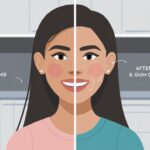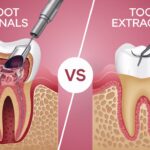Still, no matter how well you take care of your teeth, you’re bound to get some stains and tartar buildup over time. That’s why it’s important to get a professional dental cleaning at least once a year. During a dental cleaning, your dentist or dental hygienist will remove any plaque and tartar from your teeth. Plaque is a sticky film of bacteria that forms on your teeth, and tartar is hardened plaque. If plaque and tartar are not removed, they can lead to tooth decay and gum disease.
Your hygienist will also polish your teeth, which will remove any surface stains and leave your teeth looking brighter and feeling smoother. In addition to a dental cleaning, you can also help keep your teeth stain- and tartar-free by brushing with a toothpaste that contains fluoride, flossing every day, and avoiding foods and drinks that can cause staining.
So, don’t neglect your teeth! A little bit of effort now can save you a lot of time and money down the road.
What is Dental Cleaning?
A professional teeth cleaning is a routine cleaning done by a dentist or dental hygienist to remove dental plaque (a sticky film of bacteria), tartar (hardened plaque that can only be removed with special instruments), and stains from your teeth. Routine dental cleanings are an important part of oral hygiene and are usually done every six months, although people with certain risk factors (such as gum disease) may need to have them more often.
During a dental cleaning, the dentist or dental hygienists will first use a small, handheld mirror to examine your teeth and gums for signs of disease or other problems. They will then use a scaler (a small, curved instrument) to remove plaque and tartar from your teeth, both above and below the gum line. Next, they will use a polishing tool to remove any remaining plaque and stains from your teeth. Finally, they will floss your teeth and apply a fluoride treatment to help prevent cavities.
Professional dental cleanings are an important part of oral hygiene and can help prevent gum disease, tooth decay, and other problems. If it has been more than six months since your last dental cleaning, make an appointment with your dentist or dental hygienist today.
How Often Do You Need Routine Dental Cleaning?
It’s important to keep up with your regular dental cleanings and check-ups. The American Dental Association (ADA) recommends that most people have a dental cleaning and check-up at least once every six months. The ADA also recommends that people with a high risk of tooth decay or gum disease have a teeth cleaning and check-up every three to four months.
Your dentist can determine if you’re at a high risk for these problems based on your medical and dental history, as well as a physical examination of your teeth and gums. You may need to have more frequent routine dental cleaning and check-ups if you have any of the following conditions:
- Gum disease
- Tooth decay
- Dry mouth
- Certain medical conditions, such as diabetes
- Smoking
- Implants
- Piercings in your mouth
If you have any of these conditions, your dental hygienist will likely recommend that you have a teeth cleaning and check-up every three to four months. It’s important to keep up with your regular dental cleaning and check-ups to maintain good oral health. The ADA recommends that most people have a routine dental cleaning and check-up at least once every six months.
Benefits of Regular Dental Cleanings
It’s no secret that regular dental cleanings and checkups are important for maintaining good oral health. What you may not know is that these preventive measures can also save you time and money in the long run. Here are just a few of the benefits of keeping up with your regular teeth cleaning:
- Dental cleanings remove plaque and tartar that can lead to dental decay and gum disease.
- Regular dental cleanings can help to prevent bad breath.
- Routine cleaning can remove stains and discoloration from your teeth, giving you a brighter, more youthful smile.
- Keeping up with your routine dental cleanings can help to catch small problems before they become big (and expensive) problems.
- Professional teeth cleanings can help you to feel more confident about your smile.
So, as you can see, there are many reasons to make sure you keep up with your regular dental cleanings. Not only will your mouth thank you, but your wallet will too!
The Professional Teeth Cleaning Process
When you visit the dentist for a professional teeth cleaning, the dental hygienist will use special instruments to remove plaque and tartar and stains from your teeth. The process is usually quick and painless, and it leaves your teeth feeling clean and looking bright.
- The first step in the professional teeth cleaning process is to remove any large pieces of plaque and tartar from your teeth. The hygienist will use a small mirror to help them see your teeth clearly, and then they will use a scaler to scrape the tartar off of your teeth.
- Next, the hygienist will use a rotating brush to clean your teeth. The brush will have bristles that are soft enough to not damage your teeth, but firm enough to remove any remaining plaque and stains. The hygienist will use a small amount of toothpaste on the brush, and they will brush your teeth in a circular motion.
- After your teeth have been brushed, the hygienist will use a water pick to flush out any remaining plaque and debris. The water pick uses a stream of water to remove any plaque that is stuck in between your teeth.
- Finally, the hygienist will use a fluoride rinse to help prevent cavities. The rinse will help to harden the enamel on your teeth and make them less likely to develop cavities in the future.
Contact Our Dental Professional in Houston, TX
URBN Dental is a state-of-the-art dental clinic specializing in cutting-edge treatments to help you maintain optimal oral hygiene, prevent gum disease, and improve overall oral health. Our dental hygienists help you remove all the plaque and tartar from your gum line and teeth to achieve perfect dental health. You can find our dental clinics in Uptown Houston, Midtown Houston, or Montrose. Please schedule an appointment at your nearest dental clinic in Houston.















